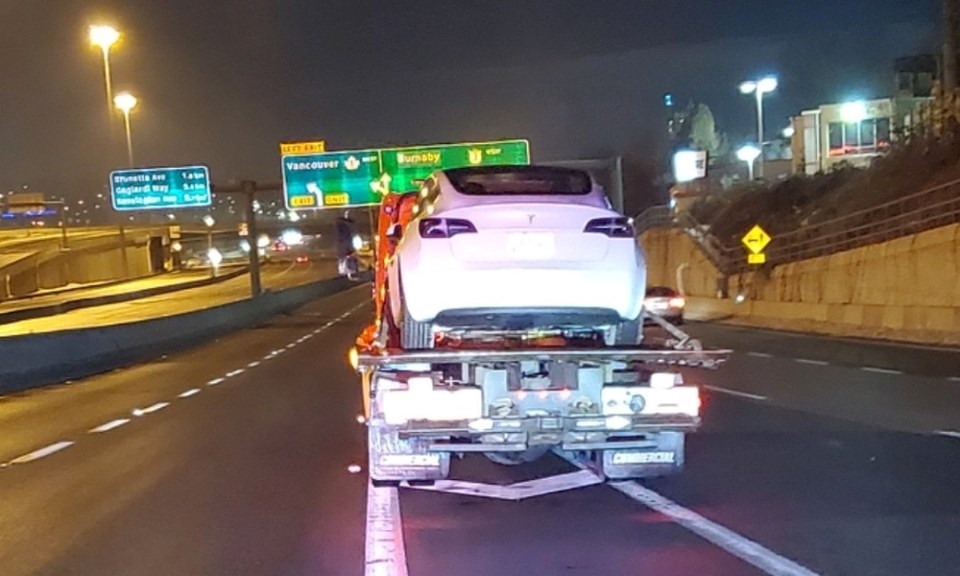Six vehicles in four hours summed up a busy night shift for Coquitlam RCMP traffic enforcement this past weekend.
And it's left officers wondering why some drivers still choose to speed up or get behind the wheel while impaired, and put themselves and others at risk.
On Sunday night (Dec. 4), four vehicles were taken off the road along different sections of Lougheed Highway after their drivers were caught excessively speeding, including one at 90 km/h above the posted limit.
The other two were impounded after the operators were found to be under the influence of alcohol.
"There is no reason to drink and drive as there are plenty of safe transportation alternatives," said spokesperson Cpl. Alexa Hodgins in a statement to the Tri-City News.
"It's surprising that drivers still want to roll the dice by driving impaired or excessively speeding but then we catch them."
The maximum fine for excessive speeding is $483 under Section 148(1) under the B.C. Motor Vehicle Act, and the minimum impoundment length is seven days.
However, that could be extended if a review of the operator's history deems it necessary.
Timeline
The first two speedsters were seen driving well above the limit at the same location along Highway 7.
After 10 p.m. on Sunday, Mounties clocked a driver at 108 km/h in the 60 zone of Lougheed at its Hastings Street intersection in Port Coquitlam, while another motorist was caught at 102 km/h at 11 p.m.
Then, at 11:46 p.m., a vehicle was seen speeding west on Lougheed through Coquitlam with 116 km/h appearing on police radar in a 70 zone at Orchid Drive.
Traffic cops impounded its first vehicle of the night for impaired driving just west of Mundy Park after its operator was determined to be above the legal alcohol limit.
This took place at 12:39 a.m. on Monday (Dec. 5) in the 1900-block of Como Lake Avenue.
The fourth lead foot was the fastest of the shift, according to Mounties, clocking at 160 km/h in the 70 zone at Lougheed Highway and Pitt River Road.
That's 128 per cent faster than the posted limit, and the driver's vehicle was impounded shortly after 1:10 a.m.
RCMP's traffic ended with the impoundment of a second impaired driver's vehicle around 1:51 a.m. at the intersection of Pinetree Way and Burlington Drive in Coquitlam's City Centre.
"Speed and alcohol are major contributing factors to car crash fatalities. Slow down and don't drink and drive," added a Coquitlam RCMP social media post.
In the case of Lougheed Highway and Pitt River Road incident, ICBC recorded 318 crashes at that intersection between 2017 and 2021, including fatal incidents.
Tips
RCMP are also encouraging commuters to drive to the conditions as temperatures drop and more snow in the forecast for the region:
- Beware of unpredictable weather
- If you'll be travelling, snow, sleet, rain, hail, ice and fog are just some of the challenging fall conditions you should be prepared for on B.C. roads. Check DriveBC for road and weather conditions before your trip.
- Put on winter tires
- As of Oct. 1, vehicles must have winter tires on many B.C. highways including parts of Vancouver Island, Highway 99 to Whistler, and most highways in the Southern Interior and northern B.C.
- Prepare your vehicle
- Make sure your tires are properly inflated and in good condition, headlights and taillights are in working order, and keep wiper fluid topped up for clearer visibility. It's also important to prepare for the unexpected by keeping an emergency kit in your vehicle with items like warm clothing, food, water, blankets and more.
- Take caution with wildlife
- Watch for wildlife warning signs — they're posted where animals are most likely to be on the road. Be very alert at dusk or dawn when animals are most likely to be on the road. If you see wildlife on or near the road, slow down and use caution so you have time to react if needed.
- Drive to the conditions
- When driving on snow, ice, slush or in rain or fog, slow down. Allow yourself at least twice the normal braking distance on wet or slippery roads.
- Keep you mind and eyes on the road
- Distracted driving is a top contributing factor in crashes this long weekend. Program your GPS before you head out for your trip and leave your phone alone.





